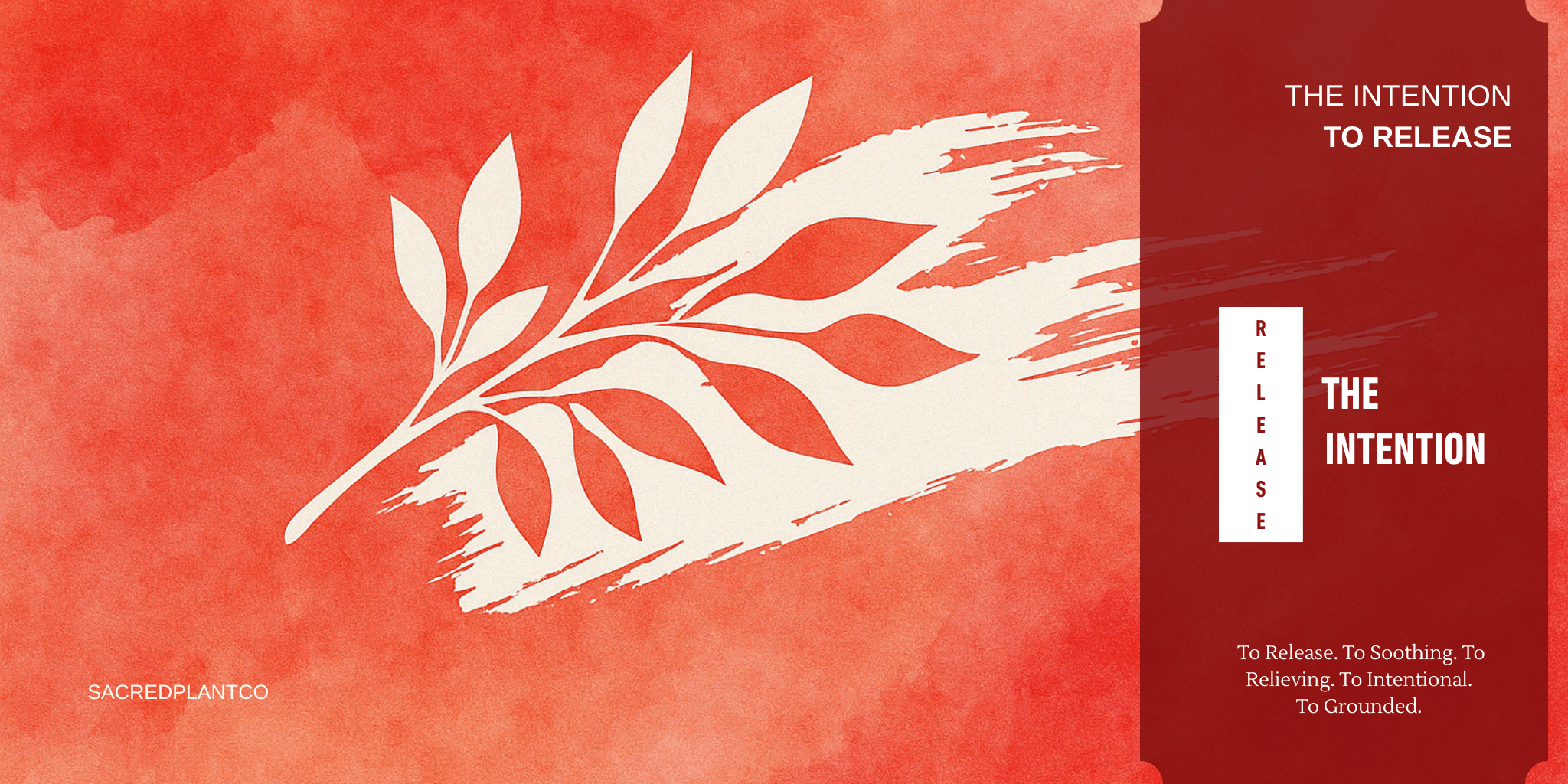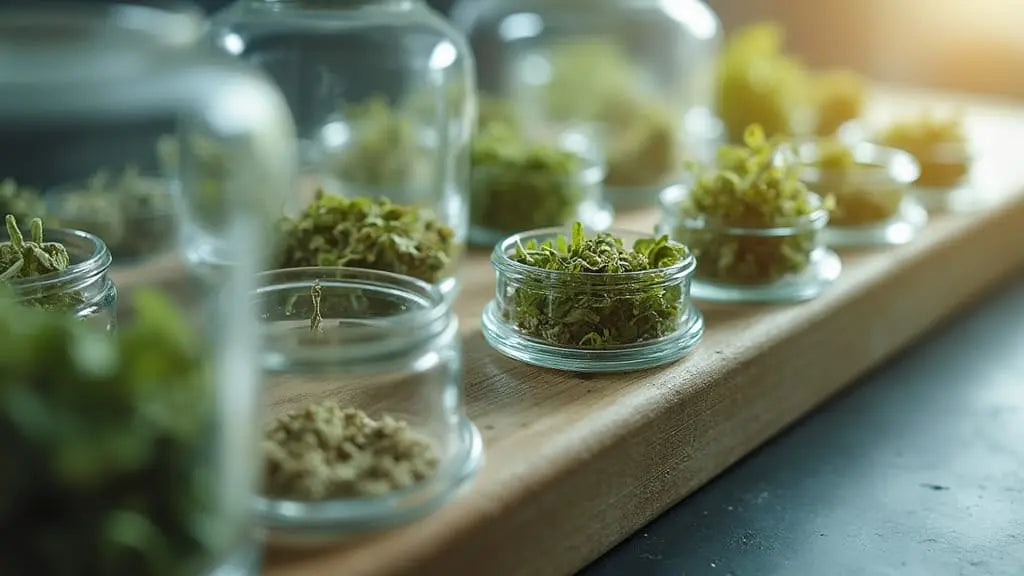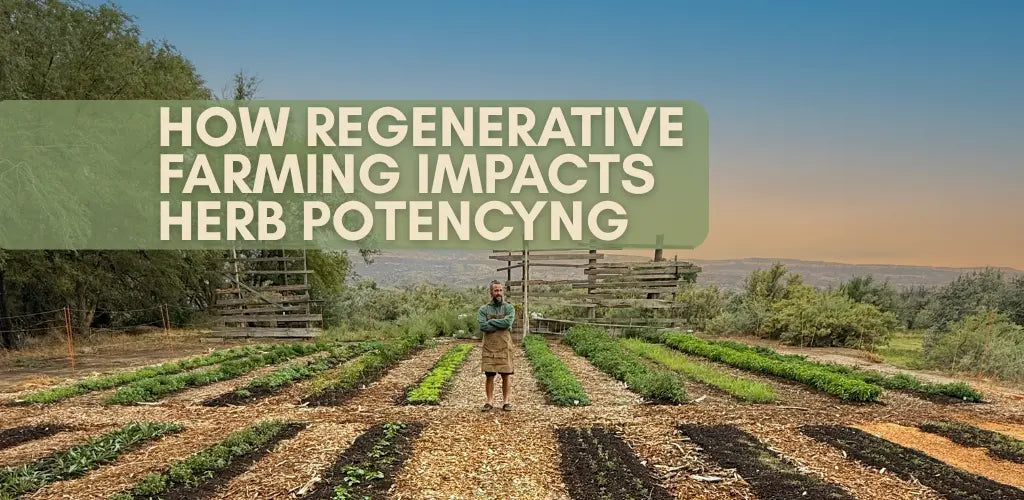How to Choose the Right Herb by Intention: Start with the Need to Release
How to Choose an Herb When You Don’t Know What You Need | By Intention: To Release
Begin with the Intention to Release
There are times when the pressure isn’t acute, but it’s constant. When you're not falling apart, but you're stretched too thin. When your body holds tension you didn’t know you were carrying, and your mind spins through things you never gave yourself time to let go of.
You might not be in crisis. But you’re not relaxed either.
This is where symptom-based herbalism can feel incomplete. Because what you need isn't a stimulant or sedative. What you need is release—from tension, from expectation, from whatever emotional weight has overstayed its welcome in your body.
In intentional herbalism, we don’t just match herbs to conditions—we match them to states of being. And when your body is asking for release, your herbs should make space for that—physically, emotionally, energetically.
This is where Passionflower becomes a guide.
Begin with Passionflower: For Letting Go Without Losing Yourself

Passionflower (Passiflora incarnata) is a plant that knows how to unwind the inner knots. It doesn’t sedate—it unravels. It works with the nervous system in a way that feels like an exhale after a held breath.
Traditionally used to calm nervous tension, ease circular thinking, and support restful sleep, Passionflower is especially suited for moments when your stress feels trapped in your muscles, your breath, and your overthinking mind.
It’s particularly useful when:
-
You’ve been carrying too much for too long
-
Sleep won’t come because your thoughts won’t stop
-
You feel irritable, agitated, or on edge
-
Your body feels like it’s in a constant state of micro-bracing
Passionflower invites the nervous system to soften without going slack. It helps you drop what’s no longer needed—without shutting down your awareness or focus.
You don’t have to collapse to find stillness. Passionflower helps you unwind while staying present.
The Intention to Release: What It Really Means
In the context of plant work, to release is not the same as giving up. It’s about letting go of what no longer serves your system—whether that’s physical tension in the shoulders, an emotional loop that keeps replaying, a breath you didn’t realize you were holding, or the constant internal pressure to stay productive. Releasing might look like your jaw finally unclenching after a long day, or your breath deepening without force. It can mean shifting from high alert to a state of grounded calm, or finally allowing yourself to let go of guilt, pressure, or shame that has been quietly stored in the body. The right herb won’t force this process—it won’t sedate or override your system. Instead, it creates the conditions for safety and softness, where true release becomes possible.
Supporting Herbs for the Intention to Release
While Passionflower is your primary ally here, other herbs can add nuance to this intention—depending on your body’s particular needs and rhythms.
Kava Kava Root (Piper methysticum)

For deep physical and emotional release, Kava Kava is one of the most effective herbs. It’s traditionally used in Polynesian cultures for relaxation, ceremonial decompression, and nervous system reset.
Kava works especially well when the stress you're carrying is visceral—stored in the body, in the chest, in the jaw. It's stronger than Passionflower and can sometimes bring a wave of emotional release. Best used in the evenings or during emotional processing.
Valerian Root (Valeriana officinalis)

When your body can’t stop clenching and your sleep feels shallow or delayed, Valerian offers a heavier, more sedative kind of release. It's especially helpful for muscle relaxation and deep sleep when Passionflower alone isn't enough.
Valerian works well when you’re exhausted but wired—when you need to unwind your body and turn off your mental chatter completely. Use it with care, and preferably when you're not planning to work or drive.
Green Tea (Camellia sinensis)

While not sedating, Green Tea offers a different kind of release: one that comes through mental clarity and emotional softening. Its L-theanine content supports calm focus, while the gentle caffeine provides light energy without stimulation.
Use Green Tea when your release needs to be active—like releasing resistance to movement, decision-making, or creativity. It’s ideal for people who feel stuck but don’t want to feel sedated.
Why These Herbs Help You Let Go: The Science Behind the Shift
The herbs aligned with the intention to release work primarily through the nervous system, muscle tension pathways, and the limbic system—the part of the brain responsible for processing emotion and stress. Passionflower gently increases GABA activity in the brain, helping calm overactive neural patterns and ease the kind of nervous tension that keeps the body bracing and the mind spinning. Kava Kava acts more broadly, influencing both GABA and dopamine receptors, making it particularly effective for deep physical relaxation and easing emotional stress, especially in socially charged or high-anxiety environments. Valerian Root supports the natural release of GABA as well, helping to quiet the stress response, promote deeper sleep, and relax tight musculature—most noticeably in the evening when the body should be winding down. Green Tea, while more stimulating on the surface, contains L-theanine, an amino acid that fosters alpha brainwave activity. This brainwave state is associated with calm focus, creative flow, and lowered tension without sedation. Together, these herbs help regulate your system’s stress response and invite a gentle unwinding of both body and mind. The result is a state where you no longer feel the need to hold everything together, giving you physiological permission to soften, breathe deeper, and let go.
How We Can Release: Herbal Rituals and Spiritual Practices

Release is not always a physical act. Often, it’s something quieter—emotional, energetic, or symbolic. It may begin with a breath, a word, a cup of tea. Herbalism, when approached with intention, becomes more than consumption—it becomes a practice. A space to listen to what the body is holding, and to gently invite it to let go.
To release is to acknowledge that your nervous system has limits. That your spirit can only carry so much before it begins to fray. Herbs like Passionflower, Kava, and Valerian don’t just support this physiologically—they create the inner conditions for release to happen on a deeper level.
You might begin by steeping Passionflower tea in silence. As it brews, write down one thought or emotion that you’ve been carrying that no longer belongs to you. As you sip, allow yourself to feel it—not to dwell in it, but to witness and soften around it. When you’re done, burn or bury the note, letting the release become tangible.
Or perhaps you end your day with a bath. Add a strong infusion of Valerian root or Kava, dim the lights, and soak with the intention of melting tension stored in your muscles. As the water holds your weight, let your jaw unclench, your breath deepen, your shoulders drop.
You can also work with breath itself. As you inhale, acknowledge the weight. As you exhale, send it out—not as escape, but as permission to stop holding what was never yours to carry.
Release doesn’t always come quickly. Sometimes it’s a daily decision. A ritual repeated over time. A quiet reclaiming of your own nervous system, piece by piece.
When combined with the right herbs, these practices become anchors. Not for control, but for surrender. Not for escape, but for restoration. And in that space, release becomes not just possible—it becomes sacred.
How to Use Herbs with the Intention to Release
-
Tea: Steep Passionflower (and optionally Valerian) in a covered mug for 7–10 minutes. Sip in the evening or during emotional overwhelm.
-
Tincture: A few drops of Passionflower or Kava before a stressful conversation, meditation, or bedtime can offer fast-acting relief.
-
Powder or Capsule: Use Valerian root when you need sustained muscle relaxation or deeper sleep support.
-
Ritual: Light a candle, write what you’re ready to release, and sip your tea with awareness. Combine with slow breathwork or a warm bath for full-body integration.
Choosing to Release Is a Practice
Letting go doesn’t always happen in one sitting. Sometimes it takes several days of consistent care to convince the body it’s safe enough to relax.
The more regularly you work with these herbs, the easier it becomes to shift your state when tension builds. You’re not fixing yourself—you’re allowing space for decompression. And in that space, healing happens naturally.
Learn More: Herbs That Support Emotional Release and Nervous System Reset
Sacred Plant Co offers premium herbal allies to support your intention to let go—gently and effectively.
Discover the calming strength of Passion Flower—an ethereal herb known for supporting relaxation, nervous system balance, and emotional release. Explore its history, uses, and gentle power.
Explore the elegance of Sencha Green Tea—celebrated for its smooth flavor, calming energy, and rich antioxidant profile. Learn how this revered tea supports clarity, focus, and gentle release.
Compare Valerian Root and Passionflower—two of nature’s most trusted sleep herbs. Discover their differences, benefits, and how to choose the best herbal support for deeper, more restful nights.
A Daily Routine to Support the Intention to Release
Release isn’t a one-time event. It’s a rhythm—something your body and spirit return to over and over, especially when life feels heavy or overstimulated. Incorporating herbs like Passionflower, Kava, or Valerian into your daily routine can help your nervous system remember how to soften, little by little.
Morning: Clear Start
Begin your day with warm water or green tea. Green tea’s L-theanine content helps ease early-morning tension and supports calm focus—ideal if your body wakes up bracing for the day ahead. As you sip, take one mindful breath and mentally set the tone: “Today, I don’t have to carry it all.”
Midday: Gentle Pause
Around midday, check in with your body. Are your shoulders creeping up? Jaw tight? Breath shallow? A few drops of Passionflower tincture or a short herbal tea break can interrupt the stress buildup before it takes hold. Use this time to stretch, reset, and bring awareness back to your physical state.
Evening: Unwind the System
Create a nighttime ritual that helps your body release tension and prepare for rest. A warm cup of Passionflower and Valerian tea can cue the nervous system to slow down. If physical stress is high, Kava Kava may be more appropriate. Dim lights, reduce stimulation, and let the herbal support signal that it's safe to let go.
Optional: Daily Reflection
Before bed, write down one thing you’re choosing to release. It doesn’t have to be big. Even naming a small pressure or thought pattern helps reinforce your practice. Burn or tear the paper if it feels right—create a visible release to match the internal one.
Start with the Intention to Release

You don’t have to hold it all together.
Not every answer lies in doing more, pushing harder, or showing up perfectly.
Sometimes, the most meaningful healing begins when you stop striving—and start releasing.
The weight may not always be visible. It might show up in small ways: shallow breaths, clenched jaws, restless sleep, a mind that won’t stop circling the same thoughts. These are not failures—they’re signals. Your body is asking for space. Your nervous system is ready to let go.
Herbs like Passionflower, Kava, Valerian, and Green Tea offer that space.
They don’t sedate or override your experience—they support your body in remembering how to soften. How to exhale without fear. How to come back to your center without collapsing under the pressure.
Release isn’t weakness. It’s a reclaiming.
It’s the moment you stop gripping and start trusting.
It’s what happens when you say: “I don’t need to carry this anymore.”
Whether you begin with a single cup of tea, a slow evening ritual, or one breath paired with a gentle tincture—that beginning counts. And every time you return to that practice, you’re building a more resilient, relaxed, and responsive version of yourself.
Start your practice with Passionflower.
Unwind stored tension with Kava.
Support deep sleep with Valerian.
Or gently re-center with calming Green Tea.
You don’t have to fix everything today.
Just soften. Just sip. Just release—gently, and on purpose.
Your body will know what to do next.





